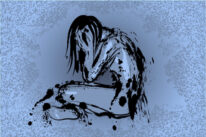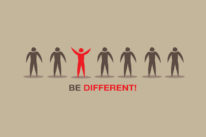
“Your worst enemy cannot harm you as much as your own unguarded thoughts.” ~Buddha
As a kid, I was taught that the Devil tempted us to do evil deeds. When I had the urge to do something naughty, I imagined a pitchfork-totin’ demon whispering into my ear. He’d encourage me to steal that Hershey’s bar from the 7-11, or to lie to my mom when she asked if I’d finished my homework.
Today, I don’t believe in the existence of the Devil, but I do believe my doubts and fears can appear to be downright devilish—if I give in to their whisperings. But what if these discursive thoughts aren’t “evil” after all? What if we need our cravings and impulses to help us see the truth in our lives and push past negative patterns?
Recently, I had the chance to test this theory when my book manuscript was rejected by a major publisher.
I’d poured my heart into those pages and anxiously waited for weeks only to receive a standard “thanks but no thanks” reply. After years of work, in an instant, my hopes were crushed, and I was swamped with doubt and self-pity.
Soon my disappointment turned into indignation: How dare that editor reject my work! I began typing a hateful email, but (thankfully) I stopped short of clicking “Send.” Rather than write something I’d regret, I strapped on my sneakers and went for a power walk.
When I’m in a sour mood, walking usually helps me clear my head, but even on that crisp, sunny, fall day, a black cloud of dissatisfaction hovered over me. Thoughts of failure invaded my mind. With every footstep, my negative thoughts grew.
Then I smelled an all-too-familiar aroma. I glanced over and saw a man smoking a cigarette on his front porch. That scent wrapped around my brain and triggered a thought, “If you have a smoke, you’ll feel better…”
I haven’t smoked in more than three years, but somewhere in my mind, a familiar longing stirred.
I began smoking during college when I felt insecure. Over the years, anytime I felt lonely or upset—when my marriage was troubled or my career was threatened—I stepped outside and lit up a cigarette.
Even years after successfully kicking that bad habit, the associative power between my unhappiness and nicotine was still strong. The tempting thought swirled in my brain, “Bum a smoke from your neighbor! No one will know!”
Thankfully, enough time had passed since I quit and I could view my desire to smoke with objectivity. But rather than push it aside, I entertained the thought.
“That’s so interesting,” I said to my former-addicted self. “You haven’t craved a cigarette in years, and now you’re upset and bam! You have a craving.”
In truth, even the part of me that used cigarettes for comfort didn’t really want to smoke again. Addicted Me knew the reality: Tobacco tastes bitter and the smoke burns my throat and makes me feel crappy—not to mention all the horrible diseases it causes. The urge to smoke was just a thought, an unhealthy one at that.
A moment later, the urge was gone, but craving that cigarette—which was once so intoxicating to me—provided a wonderful way to be present with what was happening to me physically and emotionally.
In other words, the urge to smoke became a signal encouraging me to explore what it was I really needed.
What bedevils you? The next time you’re tempted to give into an unhealthy urge, try this practice.
Observe the feeling. The craving wants your attention, so give it what it needs—for a limited time. Observe, don’t indulge. Become curious about the nature of your thought.
What does the feeling want you to do or say? When did you first feel this craving? Why is it prompting you toward an unhealthy response today?
What triggered the craving? Are you really hungry? Or do you feel angry, sad, or lonely? If the latter, what might you do to take care of the feeling without indulging in an unhealthy habit?
Entertain the thought. Rather than push it away, make a place for it in your heart. Address the thought or emotion as you would to a dear friend or child, “Hello, disappointment. I recognize you! You’re afraid of not being acknowledged, but I see you!” (This is what therapists call self-talk.)
Listen deeply to the need. At the heart of every craving is an unmet need. The need itself may not be “bad” or “wrong,” but how you take care of it can be. Rather than fill that void with a negative habit or unhealthy choice, consider what it is you really lack.
In my case, I needed acknowledgement and support. When I returned from my walk, I called a trusted friend and fellow-writer and allowed her to cheer me up. Then, we brainstormed ideas about other potential publishers for my book.
Treat yourself (and others) with compassion: Ultimately, as I walked that day, I became aware of my weaknesses and my strengths. Each time I breathed in and smelled the cigarette smoke, I breathed out gratitude that my addiction no longer had me in its grip.
And rather than beat myself up for feeling what I felt, I used the experience to generate empathy for my neighbor. Maybe he was struggling with anxiety or loneliness, too.
In the end, my craving can become my worst enemy—or a good friend. When I seek the truths that rise out of difficult situations, a seeming loss can turn into a win. If I’m aware and healthy, I might even be able to learn something very valuable and transform a negative habit into the means for healthy self-discernment.
Sad man smoking image via Shutterstock
About Brigid Elsken Galloway
Brigid Elsken Galloway is a journalist and editor who’s reported for NPR and contributes to various publications and websites. She is also on the faculty of the Institute for Conscious Being. This fall, Brigid published her first collection of essays, entitled The Nature of Things: Twenty-four Stories About Embracing Reality. She blogs at Adventures of a Southern Buddhist Catholic.













 Though I run this site, it is not mine. It's ours. It's not about me. It's about us. Your stories and your wisdom are just as meaningful as mine.
Though I run this site, it is not mine. It's ours. It's not about me. It's about us. Your stories and your wisdom are just as meaningful as mine. 